Strength Evaluation

Dorsiflexion
Test position - sitting, with the heel on floor, foot in full dorsiflexion, and
shoes and socks removed. Verbal instructions: "Bend
your foot up as far as possible."
The toes are relaxed during the test. The hand giving resistance is cupped over
the top of the foot proximal to the toes. The other hand is contoured around the
front of the leg just proximal to the ankle. The examiner then states "Hold
it, don't let me push it down".

Plantarflexion
Test position - lying on a table, foot in full plantarflexion. Verbal
instructions: "Point
your foot as far as possible."
The toes are relaxed during the test. The hand giving resistance is cupped over
the bottom of the foot proximal to the toes. The other hand is contoured around
the front of the leg just proximal to the ankle. The examiner then states "Hold
it, don't let me push it
up".
.jpg)
InversionTest position - lying on a table, foot in full inversion. Verbal instructions: "Turn
your foot in as far as possible."
The toes are relaxed during the test. The hand giving resistance grab the foot
in the middle. The examiner then states "Hold
it, don't let me
turn it out".

Eversion
Test position - lying on a table, foot in full eversion. Verbal instructions: "Turn
your foot out as far as possible."
The toes are relaxed during the test. The hand giving resistance grab the foot
in the middle. The examiner then states "Hold
it, don't let me
turn it in".
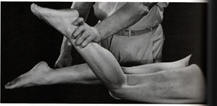 Flexion (and rotation)
Flexion (and rotation)Test position - lying on a table, face down with the kne flexed to 50-70° and with a slight external rotation of the thigh (will focus on the bicep femoris). Verbal instructions: "Flex your knee". The hand giving resistance is positioned close to the ankle and apply a pressure in the direction of the flexion (do not rotate). The examiner then states "Hold it, don't let me extend your knee".
The same proceedure can be perform with a slight internal rotation to focus on the semitendinosus and semimembranosus muscles.
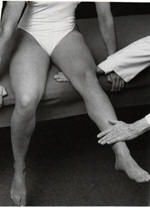
Extension
Test position - sitting upright with the knee fully extended to 0 degrees. Avoid knee hyperextension. Verbal instructions; "Straighten your knee". The hand giving resistance is contoured on top of the leg just proximal to the ankle. The other hand is placed under the thigh above the knee. The examiner then states "Hold it. Don't let me bend it".
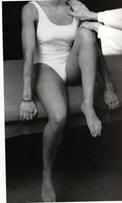
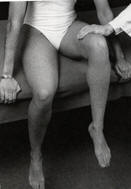 Flexion
FlexionTest position - sitting with the hip fully flexed and knee bent. The patient may place their hands on the bed or table for stability. Verbal instructions: "Raise your knee up so that the thigh are a few inches off the table." The examiner's hand giving resistance is placed on top of the thigh just proximal to the knee. The other hand provides stability at the side of the hip. The examiner then states: "Hold it. Don't let me push it down"
Can repeat the same proceedure but with the knee lifted as high as possible to focus on the illiacus and psoas muscles.
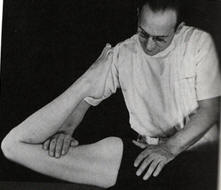
Extension
Test position - Lying on the table in a prone position, with the knee flexed at 90° or more. Verbal instructions: "Raise your knee up as high as it will go." The examiner's hand giving resistance is placed against the lower part of the posterior thigh and press against the extension. The other hand provides stability at the side of the hip. The examiner then states: "Hold it. Don't let me push it down".

Abduction
Test position - Lying on the left side to test right leg. The patient lift the right leg up. Verbal instructions: "Raise your right leg up ." The examiner's hand giving resistance is placed against the lower part of the thigh and press downward. The other hand stabilises the pelvis. The examiner then states: "Hold it. Don't let me push it down".
 Adduction
AdductionTest position - Lying on the right side to test right leg on the table. The examiner holds the upper leg in abduction, and the patient holds the table. The patient lift the right leg off the table. Verbal instructions: "Raise your right leg up as high as it will go." The examiner's hand giving resistance is placed against the lower part of the posterior thigh and press downward. The examiner then states: "Hold it. Don't let me push it down".

Internal Rotation
Test position - Sitting with the knees over the table, holding the table with hands. The patient lift the right foot on the right putting the hip in internal rotation. Verbal instructions: "Raise your right foot sidewise as high as it will go." The examiner's hand giving resistance is placed against the ankle press to the right (left of the patient) with the other hand stabilizing the knee. The examiner then states: "Hold it. Don't let me push it left".
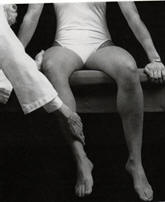
External Rotation
Test position - Sitting with the knees over the table, holding the table with hands. The patient lift the right foot on the left putting the hip in external rotation. Verbal instructions: "Raise your right foot toward the middle as high as it will go." The examiner's hand giving resistance is placed against the ankle press to the left (right of the patient) with the other hand stabilizing the knee. The examiner then states: "Hold it. Don't let me push it right".
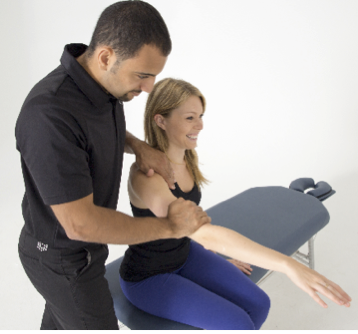
Flexion
Testing position - Patient is sitting, arm out in front at shoulder level. Elbow can be bent or not. The examiner demonstrates the motion, then states "Lift your arm in front of you to shoulder level." The hand giving resistance is contoured over the patient's arm just above the elbow. The other hand stabilizes the shoulder above the shoulder joint. The examiner states "Hold it, don't let me push it down."
 Extension
ExtensionTesting position - Patient is lying in prone position, arm straight, in extension. The examiner demonstrates the motion, then states "Lift your arm as far as it can go." The hand giving resistance is contoured over the patient's forearm just above the wrist. The other hand stabilizes the shoulder above the shoulder joint. The examiner states "Hold it, don't let me push it down."
 Abduction
AbductionTesting position - Patient sitting, arm out from the side at shoulder level. The examiner demonstrates the motion, then states "Lift your arm out to the side to shoulder level." The hand giving resistance is contoured over the patient's arm just above the elbow. The other hand stabilizes the shoulder above the shoulder joint. The examiner states "Hold it, don't let me push it down."
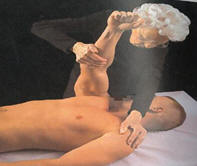 Horizontal Adduction
Horizontal AdductionTesting position - Patient lying in supine position, arm extended across the body at shoulder level. The examiner demonstrates the motion, then states "Lift your arm in front of you at shoulder level." The hand giving resistance is contoured over the patient's arm just above the elbow. The other hand stabilizes the opposite shoulder. The examiner states "Hold it, don't let me pull it up."
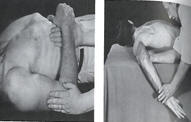 Internal
Rotation
Internal
RotationTesting position - Patient lying in supine position, arm against the torso and elbow flexed at 90° or patient lying in a prone position, arm resting on the table and elbow flexed at 90°. . The examiner demonstrates the motion, then states "Put your hand in front of you or lift your hand backward". The hand giving the resistance just above the wrist and the other hand stabilizing the elbow. The examiner states "Hold it, don't let me pull it up or push it forward."
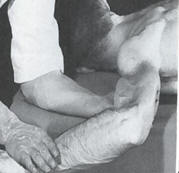 External
Rotation
External
RotationTesting position - Patient lying in prone position, elbow flexed at 90° and hand pointing forward. The examiner demonstrates the motion, then states "Lift your hand up as far as it will go". The hand giving the resistance just below the wrist and the other hand stabilizing the elbow. The examiner states "Hold it, don't let me push it down."